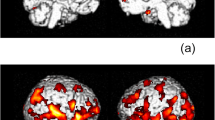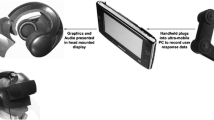Abstract
Neurocognitive compromise, a common sequela of HIV infection, ranges in severity from minor motor and information-processing speed decrements to severely incapacitating symptoms that affect functional independence. However, with the emergence of highly active antiretroviral therapy (HAART), neurocognitive phenotypes have become highly heterogeneous and increasingly fail to resemble pre-HAART presentations. This article provides an overview of our current knowledge of HIV-associated neuropsychological abnormalities, with an emphasis on the most recent attempts to classify cognitive impairment within Western and developing societies, the emergence of diverse cognitive presentations in the post-HAART era, factors that moderate the development or impact of HIV-related neurocognitive and functional deficits, and the neurophysiologic consequences of infection.
Similar content being viewed by others
References and Recommended Reading
Ances BM, Ellis RJ: Dementia and neurocognitive disorders due to HIV-1 infection. Semin Neurol 2007, 27:86–92.
Heaton RK, Grant I, Butters N, et al.: The HNRC 500—neuropsychology of HIV infection at different disease stages. HIV Neurobehavioral Research Center. J Int Neuropsychol Soc 1995, 1:231–251.
Heaton RK, Marcotte TD, Mindt MR, et al.: The impact of HIV-associated neuropsychological impairment on everyday functioning. J Int Neuropsychol Soc 2004, 10:317–331.
Hinkin CH, Castellon SA, Durvasula RS, et al.: Medication adherence among HIV+ adults: effects of cognitive dysfunction and regimen complexity. Neurology 2002, 59:1944–1950.
Marcotte TD, Heaton RK, Wolfson T, et al.: The impact of HIV-related neuropsychological dysfunction on driving behavior. The HNRC Group. J Int Neuropsychol Soc 1999, 5:579–592.
Moore DJ, Masliah E, Rippeth JD, et al.; HNRC Group: Cortical and subcortical neurodegeneration is associated with HIV neurocognitive impairment. AIDS 2006, 20:879–887.
Brew BJ: Evidence for a change in AIDS dementia complex in the era of highly active antiretroviral therapy and the possibility of new forms of AIDS dementia complex. AIDS 2004, 18(Suppl 1):S75–S78.
Paul RH, Yiannoutsos CT, Miller EN, et al.: Proton MRS and neuropsychological correlates in AIDS dementia complex: evidence of subcortical specificity. J Neuropsychiatry Clin Neurosci 2007, 19:283–292.
Ragin AB, Wu Y, Storey P, et al.: Diffusion tensor imaging of subcortical brain injury in patients infected with human immunodeficiency virus. J Neurovirol 2005, 11:292–298.
Wu Y, Storey P, Cohen BA, et al.: Diffusion alterations in corpus callosum of patients with HIV. Am J Neuroradiol 2006, 27:656–600.
Hinkin CH, van Gorp WG, Mandelkern MA, et al.: Cerebral metabolic change in patients with AIDS: report of a six-month follow-up using positron-emission tomography. J Neuropsychiatry Clin Neurosci 1995, 7:180–187.
Marcotte TD, Deutsch R, McCutchan JA, et al.: Prediction of incident neurocognitive impairment by plasma RNA and CD4 levels early after HIV seroconversion. Arch Neurol 2003, 60:1406–1412.
Hardy DJ, Hinkin CH, Levine AJ, et al.: Risky decision making assessed with the gambling task in adults with HIV. Neuropsychology 2006, 20:355–360.
American Academy of Neurology: Clinical confirmation of the American Academy of Neurology algorithm for HIV-1-associated cognitive/motor disorder. Neurology 1996, 47:1247–1253.
Antinori A, Arendt G, Becker JT, et al.: Updated research nosology for HIV-associated neurocognitive disorders. Neurology 2007, 69:1789–1799.
Robertson KR, Nakasujja N, Wong M, et al.: Pattern of neuropsychological performance among HIV positive patients in Uganda. BMC Neurology 2007, 7:8–15.
Vasan A, Renjifo B, Hertzmark E, et al.: Different rates of disease progression on HIV type 1 infection in Tanzania based on infecting subtype. Clin Infect Dis 2006, 42:843–852.
Wong M, Robertson K, Nakasujja N, et al.: Frequency of and risk factors for HIV dementia in an HIV clinic in sub-Saharan Africa. Neurology 2007, 68:350–355.
Sacktor N: The epidemiology of human immunodeficiency virus-associated neurological disease in the era of highly active antiretroviral therapy. J Neurovirol 2002, 8(Suppl 2):115–121.
McArthur JC: HIV dementia. J Neuroimmunol 2004, 157:3–10.
Centers for Disease Control and Prevention: HIV/AIDS Surveillance Report, 2005. Atlanta: Department of Health and Human Services, Centers for Disease Control and Prevention; 2007.
Philips BR, Mole LA, Backus LI, et al.: Caring for Veterans With HIV Disease. Washington DC: Department of Veterans Affairs; 2003.
Valcour V, Shikuma C, Shiramizu B, et al.: Higher frequency of dementia in older HIV-1 individuals: the Hawaii Aging with HIV-1 Cohort. Neurology 2004, 63:822–827.
Sulkowski MS, Thomas DL: Hepatitis C in the HIV-infected person. Ann Intern Med 2003, 138:197–207.
Greub G, Ledergerber B, Battegay M, et al.: Clinical progression, survival, and immune recovery during antiretroviral therapy in patients with HIV-1 and hepatitis C virus coinfection: the Swiss HIV Cohort Study. Lancet 2000, 356:1800–1805.
Hinkin CH, Castellon SA, Levine AJ, et al.: Neurocognition in individuals co-infected with HIV and hepatitis C. J Addict Dis 2008, 27:11–17.
Forton DM, Karayiannis P, Mahmud N, et al.: Identification of unique hepatitis C virus quasispecies in the central nervous system and comparative analysis of internal translational efficiency of brain, liver, and serum variants. J Virol 2004, 78:5170–5183.
Forton DM, Thomas HC, Murphy CA, et al.: Hepatitis C and cognitive impairment in a cohort of patients with mild liver disease. Hepatology 2002, 35:433–439.
El-Serag HB, Hampel H, Yeh C, et al.: Extrahepatic manifestations of hepatitis C among United States male veterans. Hepatology 2002, 36:1439–1445.
Taylor MJ, Alhassoon OM, Schweinsburg BC, et al.: MR spectroscopy in HIV and stimulant dependence. J Int Neuropsychol Soc 2000, 6:83–85.
Durvasula RS, Myers HF, Satz P, et al.: HIV-1, cocaine, and neuropsychological performance in African American men. J Int Neuropsychol Soc 2000, 6:322–335.
Levine AJ, Hardy DJ, Miller E, et al.: The effect of recent stimulant use on sustained attention in HIV-infected adults. J Clin Exp Neuropsychol 2004, 28:29–42.
Martin EM, Pitrak DL, Weddington W, et al.: Cognitive impulsivity and HIV serostatus in substance dependent males. J Int Neuropsychol Soc 2004, 10:931–938.
Levine AJ, Singer EJ, Shapshak P: The role of host genetic factors in the susceptibility for HIV-associated neurocognitive disorders. AIDS Behav 2008 Feb 9 [Epub ahead of print].
van Rij RP, Portegies P, Hallaby R, et al.: Reduced prevalence of the CCR5 delta32 heterozygous genotype in human immunodeficiency virus-infected individuals with AIDS dementia complex. J Infect Dis 1999, 180:854–857.
Singh KK, Ellis RJ, Marquie-Beck J, et al.: sCCR5 polymorphisms affect neuropsychological impairment in HIV-1-infected individuals. J Neuroimmunol 2004, 157:185–192.
Kaul M, Lipton SA: Chemokines and activated macrophages in HIV gp120-induced neuronal apoptosis. Proc Natl Acad Sci U S A 1999, 96:8212–8216.
Valcour V, Shikuma C, Shiramizu B, et al.: Age, apolipoprotein E4, and the risk of HIV dementia: the Hawaii Aging With HIV cohort. J Neuroimmunol 2004, 157:197–202.
Suarez S, Baril L, Stankoff B, et al.: Outcome of patients with HIV-1-related cognitive impairment on highly active antiretroviral therapy. AIDS 2001, 15:195–200.
Hinkin CH, Hardy DJ, Mason KI, et al.: Medication adherence in HIV-infected adults: effect of patient age, cognitive status, and substance abuse. AIDS 2004, 18(Suppl 1):S19–S25.
Hinkin CH, Barclay TR, Castellon SA, et al.: Drug use and medication adherence among HIV-1 infected individuals. AIDS Behav 2007, 11:185–194.
Marcotte TD, Wolfson T, Rosenthal TJ, et al.: A multimodal assessment of driving performance in HIV infection. Neurology 2004, 63:1417–1422.
Marcotte TD, Lazzaretto D, Scott JC, et al.: Visual attention deficits are associated with driving accidents in cognitively-impaired HIV-infected individuals. J Clin Exp Neuropsychol 2006, 28:13–28.
Heaton RK, Velin RA, McCutchan JA, et al.: Neuropsychological impairment in human immunodeficiency virus-infection: implications for employment. Psychosom Med 1994, 56:8–17.
van Gorp WG, Rabkin JG, Ferrando SJ, et al.: Neuropsychiatric predictors of return to work in HIV/AIDS. J Int Neuropsychol Soc 2007, 13:80–89.
Filippi CG, Ulu AM, Ryan E, et al.: Diffusion tensor imaging of patients with HIV and normal-appearing white matter on MR images of the brain. Am J Neuroradiol 2001, 22:277–283.
Kieburtz K, Ketonen L, Cox C, et al.: Cognitive performance and regional brain volume in human immunodeficiency virus type 1 infection. Arch Neurol 1996, 53:155–158.
Chang L, Ernst T, Leonido-Yee M, et al.: Cerebral metabolite abnormalities correlate with clinical severity of HIV-1 cognitive motor complex. Neurology 1999, 52:100–108.
Paul R, Cohen R, Navia B, et al.: Relationships between cognition and structural neuroimaging findings in adults with human immunodeficiency virus type-1. Neurosci Biobehav Rev 2002, 26:353–359.
Thompson PM, Dutton RA, Hayashi KM, et al.: Thinning of the cerebral cortex visualized in HIV/AIDS reflects CD4+ lymphocyte decline. Proc Natl Acad Sci U S A 2005, 102:15647–15652.
Author information
Authors and Affiliations
Corresponding author
Rights and permissions
About this article
Cite this article
Foley, J., Ettenhofer, M., Wright, M. et al. Emerging issues in the neuropsychology of HIV infection. Curr HIV/AIDS Rep 5, 204–211 (2008). https://doi.org/10.1007/s11904-008-0029-x
Published:
Issue Date:
DOI: https://doi.org/10.1007/s11904-008-0029-x




